
Easy, Simple Fix Tricks on How to Increase Domain Authority and Score (UPDATED)
Last update: 28 May 2024 at 02:08 pm
Online creators want people to see their work. Whether a blog post or a local news article, anything published online has a domain, an identifying detail that people can enter to find particular content.
Since search engines, such as Google, are the primary way users find more content, you will want to ensure that the stuff you make is at the top of the search engine result pages.
To do this, you must understand how search engines choose which links to sort and display and in what order they’ll be ranked. So, let’s get started by defining some basic terms you’ll need to know to increase your domain authority.
Key Takeaways:
Understanding Domain Authority (DA):
- DA is a 1-100 score predicting a website’s search engine ranking based on factors like backlinks and reputation.
SEO Importance and Pitfalls:
- Prioritize quality content over excessive SEO practices for better domain authority.
- Avoid keyword stuffing and focus on relevance.
Improving Domain Authority:
- Build high-quality links and maintain a strong backlink profile.
- Regularly assess and optimize strategies using tools like Moz.
Meta Content and User-Friendly Websites:
- Optimize meta content for improved click-through rates.
- Ensure a user-friendly website, prioritize mobile compatibility, and avoid common errors.
Differentiating Domain and Page Authority:
- Understand the distinction between domain and page authority.
- Internal and external links influence page authority, while domain authority requires a holistic approach.
Defining Domain Authority (DA)
While domain authority may sound complicated, it’s much more straightforward than you think.
Domain authority is a search engine ranking that determines how likely a website is going to rank in terms of results.
Created by Moz, sites are assigned a number, or score, from 1 to 100; the higher the score, the higher the authority.
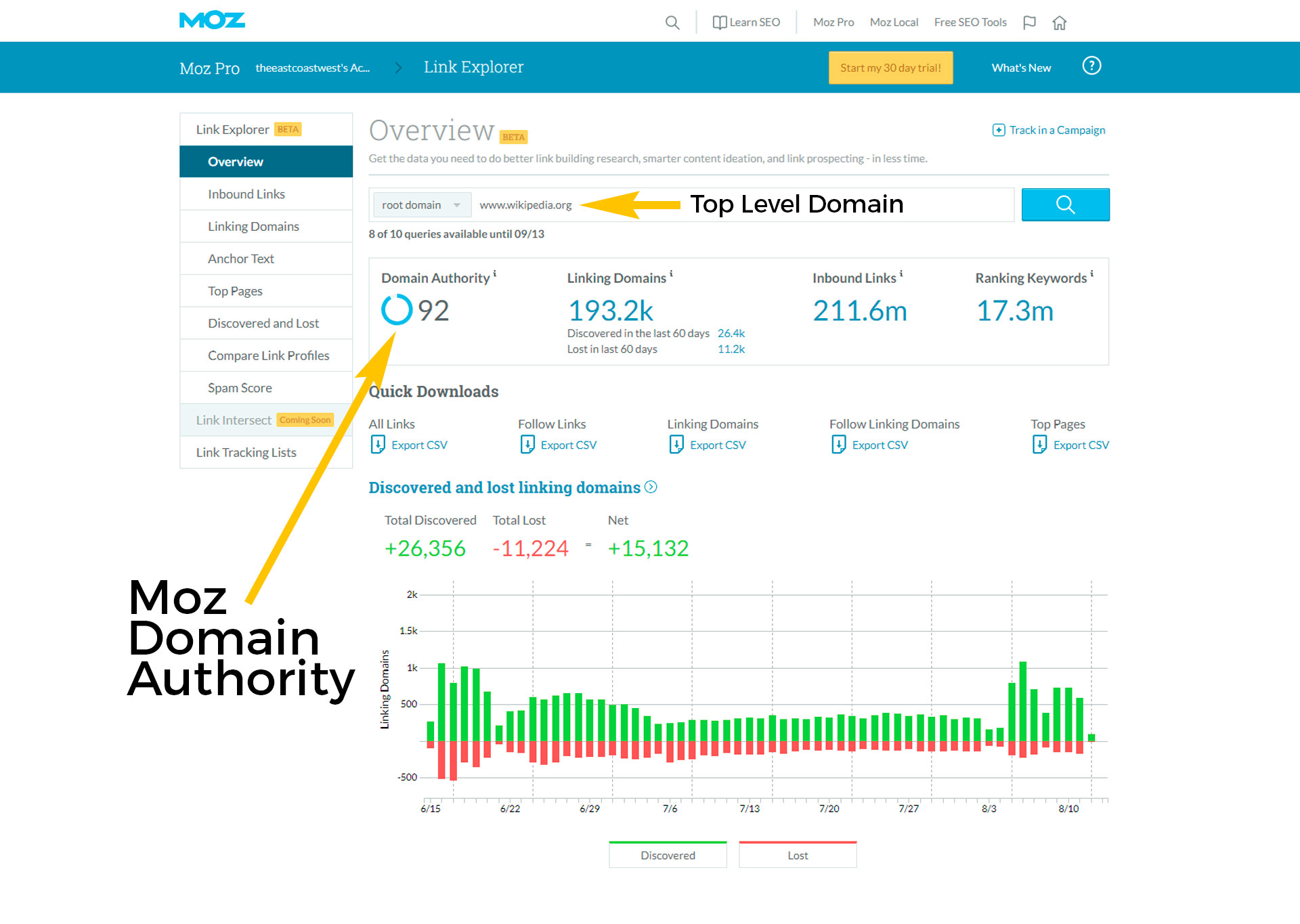
Certain websites will have better scores than others simply because they have been explicitly modified to succeed on Google.
Is Domain Authority Metric Still Important in 2024?
Yes, domain authority (DA) is still important for websites, although it’s not a direct ranking factor used by Google itself. Here’s why:
- It reflects website reputation: A high DA indicates a website is well-established and trusted by search engines. This can give you an edge over newer sites with lower DA.
- Correlates with backlinks: DA is primarily based on the number and quality of a website’s backlinks. Backlinks are still a major ranking factor for Google, so a high DA suggests a strong backlink profile.
- Useful benchmark: DA helps you track your SEO progress over time. Your DA should increase as you build backlinks and improve your website’s quality.
- Identify competitors: When looking at competitors in your niche, their DA can be a helpful indicator of their SEO strength.
In summary, while not a direct ranking factor, DA is a valuable tool for understanding your website’s SEO health and potential.
Understanding Search Engines
Before uprooting your entire site to improve your position on search engine result pages, you should know what users see when they enter anything into the search bar.
Results are sorted into a few categories based on the query type. Location name or service-based searches will come up with physical places often local to the searcher’s location. Relevant pages or reviews then follow this.
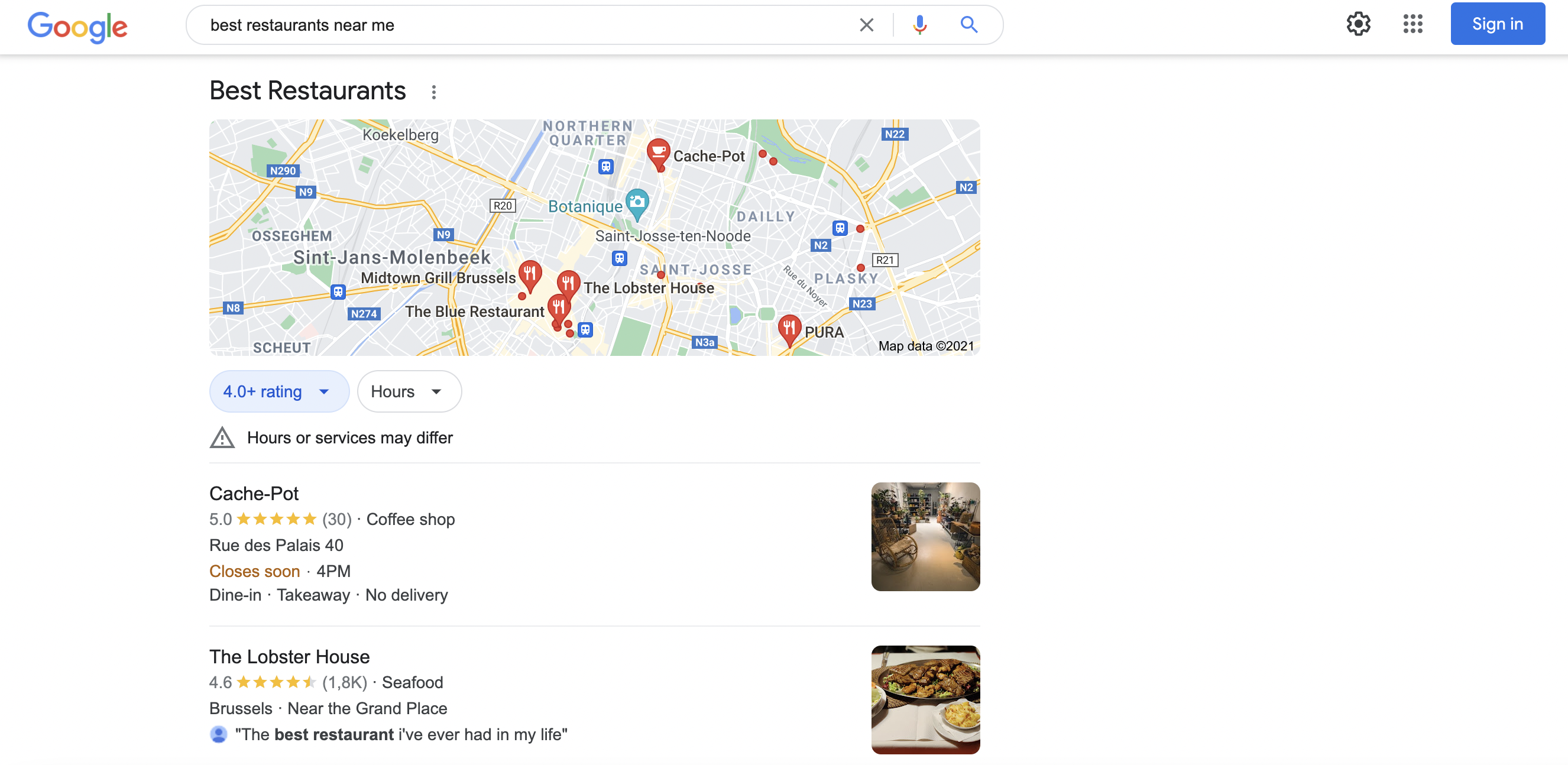
If users search for answers or definitions, Google will provide a “featured snippet.” This box summarizes what Google thinks is the most helpful response.
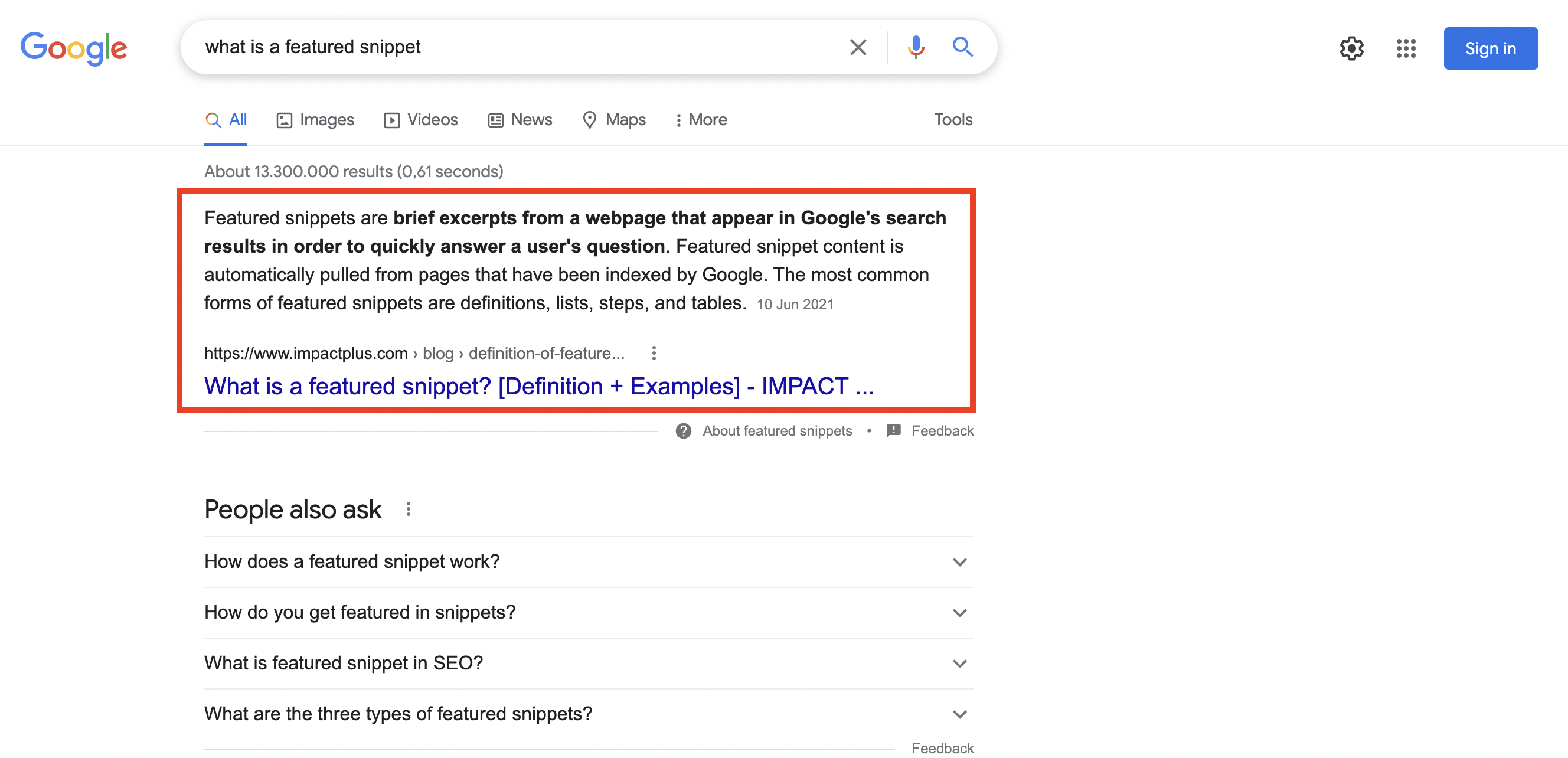
The website with the highest domain authority will appear directly under the snippet. Your goal as a creator is to get your sites as close to that position as possible. One way you can do that is to prioritize SEO on your site.
Search Engine Optimization (SEO)
SEO, or Search Engine Optimization, increases how many people visit your website.
Search engines have gathered information about every site’s content and sorted that data into an index. The indexed content is then fed through a special algorithm that attempts to match the data with a user’s search term.
By making your page the best option for SEO, you can move up your link on the search results page. If you look at a typical Google search result, the websites that appear first are the ones that Google believes have answered the query in the best or most authoritative way.
Be careful! There is such a thing as too much SEO, which will be addressed later.
Improving SEO
There are quite a few ways to improve your web page’s SEO. In the past, sites often filled their pages with meaningless, low-quality blocks of white text to rank higher in search engines.
Google, however, has learned that trick and often ranks sites with poorly written content much lower than pages with well-written content.
You can fill your page with many internal site links, giving google a clearer idea about how your site is structured. Or, you can rely on backlinks, the total number of other websites that link back to your content.
Using a link explorer, you can collect data on how often your link appears on other pages, known as a link profile. The more websites that acknowledge your website, the higher your page will rank. This process is known as link building. Link building works the best when the authority of the other page is equal to, or higher than yours.
Domain Ranking
Your domain ranking (DR) is the numerical rating of how many other pages link back to your site. Pages can loop in your site in a few ways, including using anchor text, a short phrase relevant to your content.
If your guest posts on another website or gets tagged on social media, that connection to your page will increase your overall DR.
SEO Support
If you don’t know where to start, there are many places to get SEO advice from experts. You can even work with a qualified SEO agency in the United States or your specific geographical location.
A Quick Note About Ads
Another thing you may notice when looking something up online the letters “AD” appear in the first or first few options.
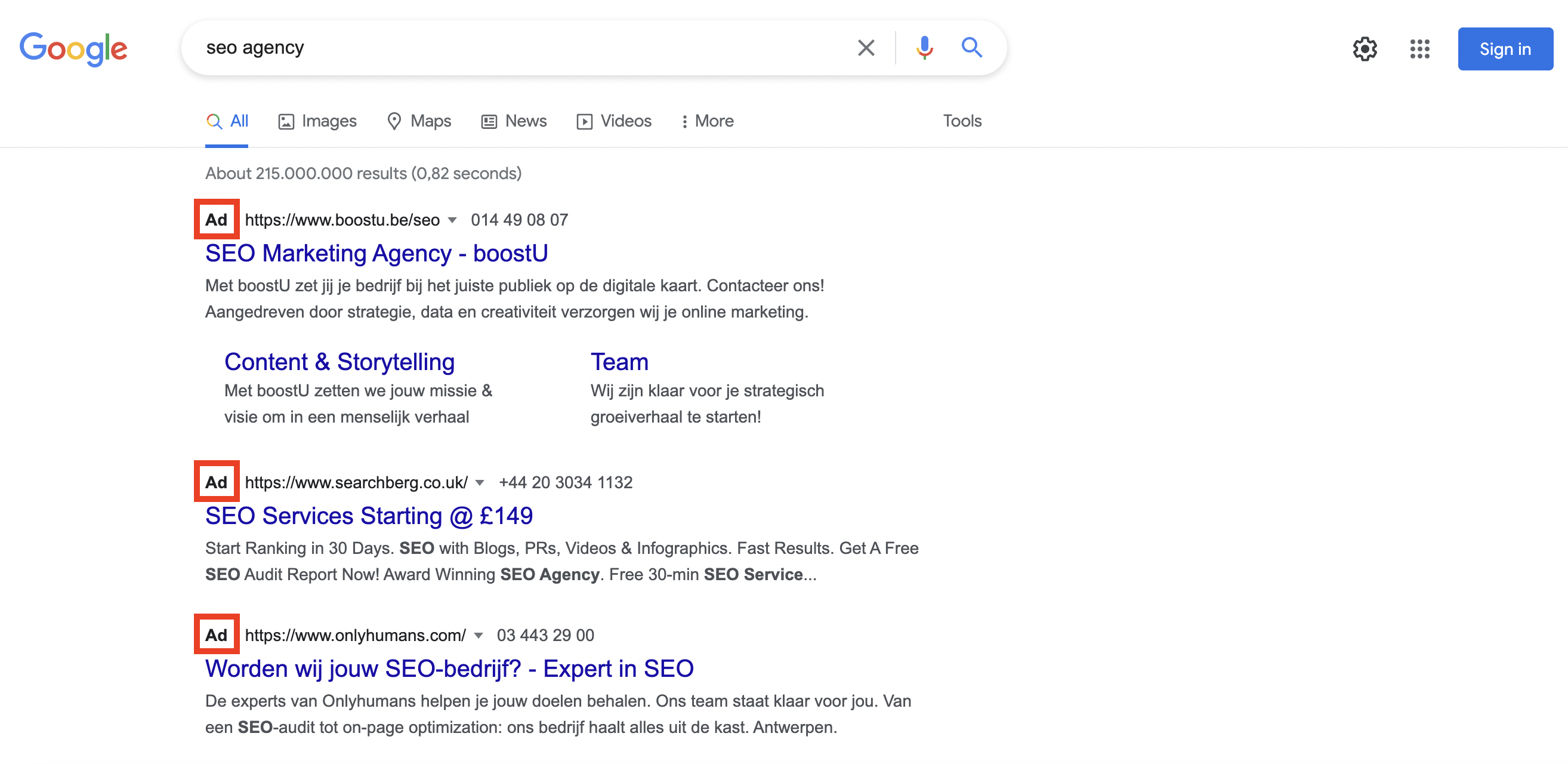
This is how Google indicates that those particular links are advertisements. As a website creator, you can purchase that space as an advertising opportunity for your company or page. However, according to the Google Ads team, this practice doesn’t inherently help with SEO, which means it won’t help your domain authority.
You’re better off investing your time and money into making great content rather than prioritizing Google ad space.
Making Good Domains
Let’s say you’re starting a blog. It will be filled with great content, exciting images, and even might have an occasional intriguing post from someone who’s guest blogging. You want to ensure your page has a good domain before you hit publish.
Good domains have the most important part of their content displayed in their links and often contain the name of the overall website as well, so users don’t lose track of where they found their information.
Your domain should be easy to remember and should stand out in the crowd. The names of web pages encompassing all the content created under that provider are known as the root domains.
Finding your Domain Authority Score
Before you can even think about increasing your domain authority, getting an initial domain authority score is in your best interest. Your link is compared to dozens of other pages based on many different standards, so it’s important to know that there isn’t one ranking factor you should dump all of your efforts into because websites that only do one thing often have very low DAs.
By getting an initial DA score, your number reveals your page authority and gives you a quantifiable data point to start from. A few things contribute to your overall score, and these factors are known as an authority metric.
Moz offers a free tool to find your domain score and even provides options for increasing your rating. It’s tough to influence your domain authority directly because the authority metric used to calculate your DA has to consider a multitude of factors, so it’s better to consider it as a comparison point rather than a finite standard.
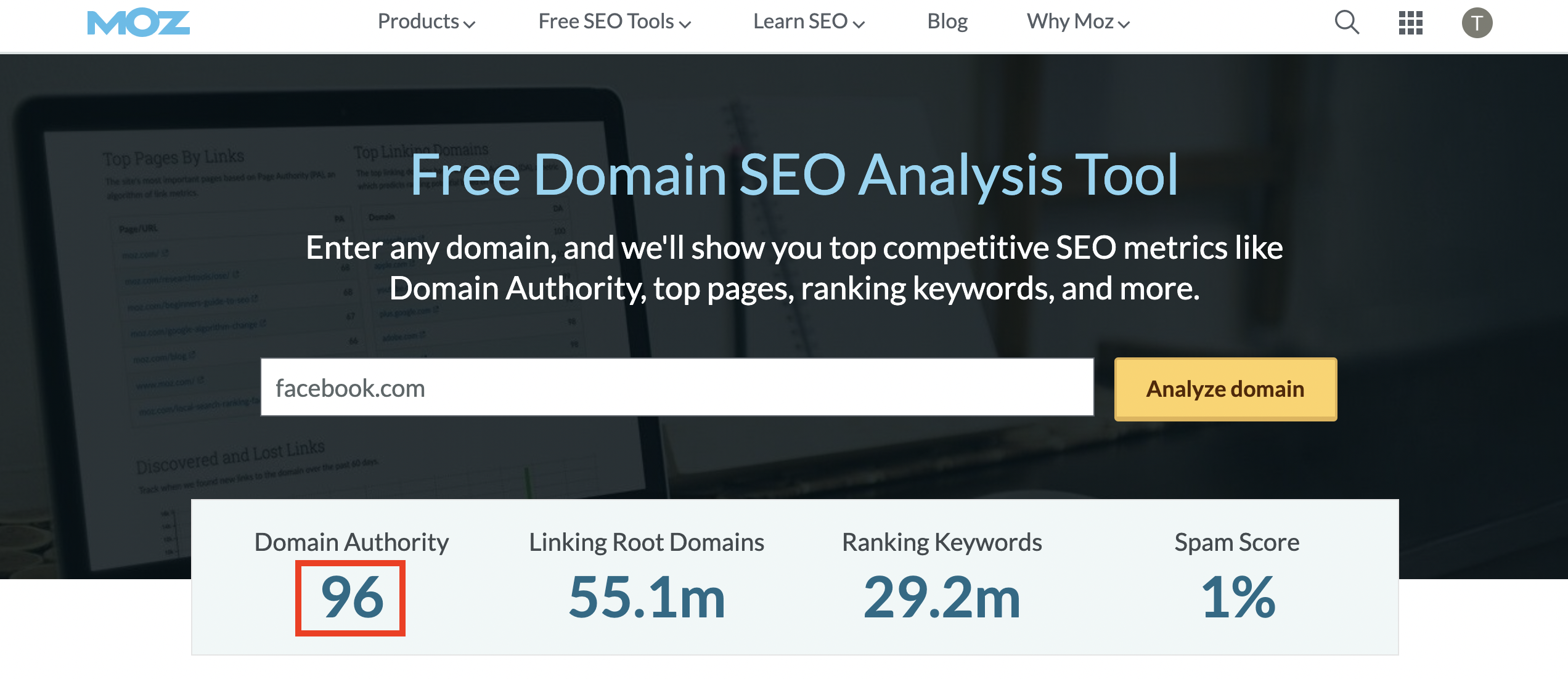
How to Increase Your Domain Authority Score
Once you’ve got your domain authority scores, it’s time to dive into what will make your page rank well.
It’s important to know that domain authority is a logarithmic scale, which means it’s much easier for websites with a low domain to jump to a higher one, for example, 10-20, rather than a high-quality website to jump to an even higher number, 90-100.
If your page already has a high DA, you may have to focus more on inbound links or adjust your page to make it more mobile-friendly rather than overhauling your overall domain authority.
Domain authority comes from having high-quality links that answer common search queries. Well-known online and offline web pages, like Google or People Magazines, already have high domain authority scores because they have basic authority.
Users know who they are so that they can set the standard for domain authorities. Big brands have the advantage of inherent website authority.
If your website doesn’t have the notoriety of places like McDonald’s, you need to focus on what can improve your domain authority.
On the most basic level, it’s about ensuring your site has well-researched and well-organized content. This means citing your sources or mentioning who has the rights reserved for any pages you link to that aren’t part of your netlinking.
Acknowledging your content’s origin authority is important because it shows that you’re reliable, and other websites are more likely to consider your content high-quality.
Don’t Over Do It…
One thing you do want to avoid, however, is link stuffing. If you fill your website with other people’s links without giving any context to why they’re on your site, it will decrease your page authority.
You see it all the time on social media, where comments are filled with low-quality links that take users to spam websites or promise fake sweepstakes. Page authority doesn’t just come from other people’s words; it comes from high-quality content on your site, and earning that backlink may require a little effort. That effort is known as link building.
Essentially, increasing your domain authority means continuously growing everything else. There is a limit!
Types of Links That Increase Domain Authority
To start, any links to your site should be working. The last thing people want when they click on something they saw on a website is to arrive at an error message or an entirely blank site. You may want to check on your links occasionally or create a consistent backlink profile so you don’t lose traffic to basic domain errors.
Direct links to your domain aren’t the only way to increase your domain authority.
Any link to your subdomain or URL will also boost your authority, so having helpful and mobile-friendly root domains is important. If people can quickly and easily remember your blog’s name, they can use an internal link to access a particular blog post they want to share with someone.
Also, don’t be afraid to ask. Networking is part of any business, and if people like your content, letting them know you’re available and excited to work with them can go a long way.
This doesn’t mean that any blue highlighted text will count as a backlink. Unfortunately, email addresses aren’t added to your link profile. You also want to ensure that the links your page connects to are relevant.
Google will lower your domain authority if the links have nothing to do with your original page. It should be known that the sites that link back to your page likely use domain authority, so you can see their score and use them as inspiration.
Types of Content That Increases Domain Authority
Domain Authority doesn’t include specific categories of content in its ranking factor, so well-written websites or posts about cats and dogs will do just as well as sites about how to purchase handmade sweaters.
The only exception to this would be pages that are made to increase domain. Google won’t count sites that are just lists of links as one with authority because it doesn’t fulfill a particular query. So, SEO has its limits. There is such a thing as a website that is too focused on a domain authority score.
Domain authority comes from great content that provides a good user experience, not websites that sacrifice everything for the best domain rating.
Other pages are also likely to add your links to their pages if they like your content. Pages that rank well know the requirements and often won’t allow guest blogging from less competent sites. So, put your best content forward, and you’ll likely get a high DA.
Places to Improve Domain Authority
A common mistake that online creators make is assuming that domain authority only comes from the content on the website itself. This isn’t the case, as users usually decide whether to use that particular site before clicking on any links.
These decision-making factors can be found in what they first see when they search something into google; the meta content.
Meta Content
When a query is submitted, users see a short description of a website and a modified version of the page’s title. This is known as meta content. It gives creators a chance to give an elevator pitch of their content.
While Google doesn’t specifically designate authority to websites with solid meta content, a strong initial impression of your website will increase your click-through rate, which will, in turn, increase your chance of positively affecting your rank.
You want your website and its content to shine, so there’s no better place to start advocating for clicks than in the first thing people see when they enter a search result.
Breaking Down Meta
According to experts like Moz, Meta Content can be broken down into a few parts, all of which can be optimized as part of your plan to increase domain authority.
There’s your title with title tags and the meta description. It should be noted that some schools of thought do not place title tags as part of metadata. Still, for consistency in this article, we will put it under the aforementioned category. The terms are often also used interchangeably. Each part conveys different things to viewers.
Title & Title Tags
Titles and Title tags are your first chance to tell a search engine what the page is about and are often considered the first impression viewers have of your page*.
You want to ensure that the reader knows exactly what they’ll get when they click your link. The title tag is your title’s slogan, so it should be kept short and to the point. Search engines generally like titles under 60 characters, including spaces.
If you’re thinking of pixels, the title should be able to fit in a 600-pixel container. Anything longer than that, and you risk getting an ‘…’ added to your title, reducing the amount of information users can get from your title and its tags.

Meta Description
The meta description is a short blurb underneath your title and tag. It should serve as an active invitation for users to click on your website. It should be descriptive but to the point, as Google tends to favor descriptions that are between 50 and 160 characters*.
The best meta descriptions are written like ad copy, so you should inspire users to take action (i.e. click on your link). They may not always use your description, especially if they think it doesn’t answer a search query.
Domain Authority: Fill a Query Niche
As with any created content, the most successful ones fill a particular niche. When it comes to websites, it’s all about being the best option available. You want your website to solve as many queries as possible while avoiding being too general.
Low-quality websites often attempt to do too many things at once, so it’s better to do a few things very well and be the authority on fewer things rather than be a mediocre option for many things.
Keywords are Your Friends
Searches aren’t always entirely written out questions. More often than not, searches are short phrases with several keywords. (See what we did there?) Your website will have a higher domain authority if it has relevant keywords.
A search engine often bolds keywords that match queries, drawing users’ eyes to the relevant content.
As with any aspect of SEO, there is such a thing as too many keywords. This practice is known as keyword stuffing, where websites repeat the exact phrases repeatedly, sometimes with slight modifications, in their meta content and the actual content of the website itself.
This looks unprofessional and will lower your overall domain authority because Google’s algorithm puts keyword stuffers toward the bottom of the results page. Remember, your domain will suffer if you focus too much on SEO. Domain Authority comes from good content, not from overflowing keywords.
Examples of Pages with High DA
Sites whose domain comes to mind before you open a search engine often have a decent DA score. In addition to the ones mentioned beforehand, a page with authority can usually be found with a simple Google search.
Like any federal website, links with good authority will rank higher because real-world authority is essential to search engine authority.
Domain Score and Domain Authority
Let’s firmly clarify the connection between domain authority and score.
As mentioned, your domain score is the number assigned to your site’s authority. Websites like Moz have high authority scores because they satisfy a search engine’s authority metric.
What User Interaction Tells You About Domain Authority
Users don’t personally care about the score because they don’t see it. They see where your blog post shows up on Google or, more importantly, when it doesn’t.
A website on the second page of Google, regardless of how great the content is, will have a low domain authority score. This is specifically because most people don’t click the next page button on Google; they’d instead modify their search terms. This is another reason why having a good domain is essential.
Improve Your Domain Authority by Keeping Users in Mind.
Think about what you use every day. Whether visiting a specific website or browsing social media, you interact with domains and content more often than you realize.
The websites you visit often have a good domain authority score because the domain is entered repeatedly. Some links people click on multiple times a day raise their DA score. Consider your internet habits and loop those into your DA improvement process.
Make Your Website User Friendly
This may seem like a no-brainer for site builders, but if people who find your page organically can’t navigate it, no amount of SEO will fix it.
Avoid overloading your website with unnecessary things; make sure it’s mobile-friendly. With 2.71 billion people using smartphones daily, you’ll lose a lot of traffic to your site if you don’t adapt it to places other than a desktop.
Your page should also be free from basic composition errors like grammar, poor spelling, and even flow issues. Domain Authority isn’t just about the content on the page but also how the content is presented. Clean and easy-to-use sites do better in the world of DA.
Domain Authority vs Page Authority
At first, these two terms may seem similar; however, they’re related.
Page authority refers to where one page of a site appears on google, as compared to domain authority which is for the domain itself.
The two are intertwined, and sites with great da can suffer from low page authority.
Moz calculates the two authorities similarly, so it should be treated as a comparison statistic, not an end-all-be-all number. The distinguishing difference is that page authority doesn’t consider keywords or content optimization.
You can improve a page’s authority score similarly to increasing a domain authority score. When another high-authority site provides a quality link specifically to one page of your domain, such as sharing it on social media, your page’s score goes up.
Internal links are also a great way to raise page authority. When you provide quality links to other pages on your domain, your overall backlinks increase. Use it sparingly, as this can also contribute to the practice of link stuffing.
Pro tip: consider using an internal linking automation plugin like Link Whisper to automate internal linking as much as possible. This will save you a ton of time and effort, and the results will be the same as manual internal linking.
Conclusion
Authority extends more profoundly than the domain. Page authority can also make or break a site, no matter how uncomplicated your domain is to remember. Your links will slip in the rankings if the website is too full of non-essential fluff or isn’t very mobile-friendly. Purchasing ad space will get the word out about your website but won’t directly affect your da.
However, you can make your website more search engine-friendly by using SEO. This, like prioritizing links or filling meta content with keywords, should only be used as part of your overall digital strategy rather than as your sole tool. A website that sacrifices great content for optimization will lose out overall.
If all of this seems overwhelming, you’re not alone. With over 500,000 pages created daily, getting lost in the mix can be easy. However, there are people out there who want to help you. Moz coined the term domain authority and has many free tools to make your links stand out and more search engine friendly. Domain authority doesn’t have to be frustrating, and if you keep these tips in mind, you’ll be at the top of the results before you know it.





